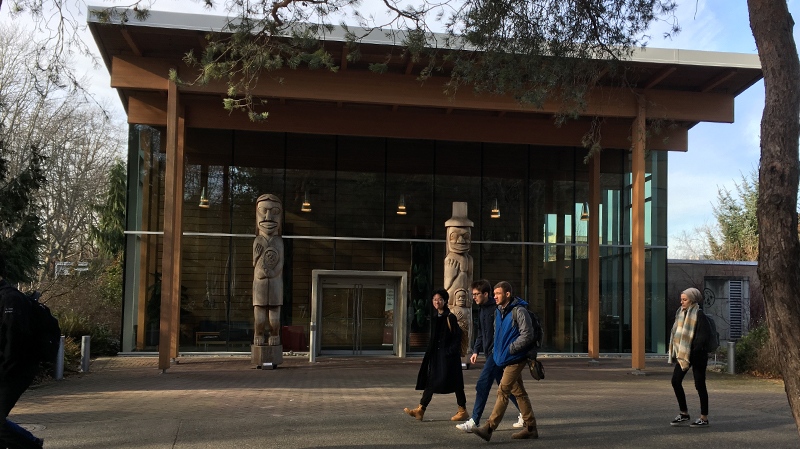First students of new UVic Indigenous law program set to graduate

The University of Victoria says the inaugural class of its Indigenous law program will graduate this year, marking a first for this type of program anywhere in the world.
The UVic Indigenous law program combines Canadian common law (JD) and Indigenous legal orders (JID), giving graduating students professional degrees in both forms of law.
The program was a first of its kind in the world when it launched four years ago, according to the University of Victoria, and gives graduates a background on a range of fields, including constitutionalism and Indigenous governance, administrative law, criminal law, environmental protection, and more.
"When I first realized the unique way that I was going to learn the law, I felt both excited for the journey and humbled by the responsibility gifted to me," said Amanda Vick, a member of the program's first graduating class and member of the Gitxsan Nation.
"We need more people in the legal sphere who are able to appreciate and utilize the knowledge of different legal orders in their practise," she said.
The inaugural class of 23 students is celebrating the milestone in a special ceremony on Saturday, before receiving their degrees during UVic's summer convocation ceremonies in June.
The Indigenous law program was developed as part of the Truth and Reconciliation Commission of Canada, and receives funding from both the provincial and federal governments, as well as from private and corporate donors and foundations.
Work is also underway on the National Centre for Indigenous Laws, which is set to begin construction at UVic this spring.
"This is an historic moment, and I am honoured to recognize and congratulate the graduating students of the first JD/JID cohort," said UVic president Kevin Hall.
"They are equipped with unique knowledge, skills and experiences that will enable them to build bridges between multiple legal systems," he said.
"I look forward to seeing the impact they make on the legal landscape in Canada, and on our ability to move meaningfully and collaboratively towards resolution of the significant and ongoing problems caused by colonialism," Hall added.
CTVNews.ca Top Stories

Can the Governor General do what Pierre Poilievre is asking? This expert says no
A historically difficult week for Prime Minister Justin Trudeau and his Liberal government ended with a renewed push from Conservative Leader Pierre Poilievre to topple this government – this time in the form a letter to the Governor General.
'I'm still thinking pinch me': lost puppy reunited with family after five years
After almost five years of searching and never giving up hope, the Tuffin family received the best Christmas gift they could have hoped for: being reunited with their long-lost puppy.
Two U.S. Navy pilots shot down over Red Sea in apparent 'friendly fire' incident, U.S. military says
Two U.S. Navy pilots were shot down Sunday over the Red Sea in an apparent 'friendly fire' incident, the U.S military said, marking the most serious incident to threaten troops in over a year of America targeting Yemen's Houthi rebels.
Big splash: Halifax mermaid waves goodbye after 16 years
Halifax's Raina the Mermaid is closing her business after 16 years in the Maritimes.
OPP find wanted man by chance in eastern Ontario home, seize $50K worth of drugs
A wanted eastern Ontario man was found with $50,000 worth of drugs and cash on him in a home in Bancroft, Ont. on Friday morning, according to the Ontario Provincial Police (OPP).
Bluesky finds with growth comes growing pains - and bots
Bluesky has seen its user base soar since the U.S. presidential election, boosted by people seeking refuge from Elon Musk's X, which they view as increasingly leaning too far to the right given its owner's support of U.S. president-elect Donald Trump, or wanting an alternative to Meta's Threads and its algorithms.
B.C. mayor gets calls from across Canada about 'crazy' plan to recruit doctors
A British Columbia community's "out-of-the-box" plan to ease its family doctor shortage by hiring physicians as city employees is sparking interest from across Canada, says Colwood Mayor Doug Kobayashi.
It was Grandma, in the cafe with a Scrabble tile: Game cafes are big holiday business
It’s the holidays, which means for many across the Prairies, there’s no better time to get locked in a dungeon with a dragon.
Cancer centre raises $2.7 million for purchase of 'game changer' surgical robot
The Windsor Cancer Centre Foundation has raised a record breaking $2.7 million through the Grow on Windsor Campaign.
































